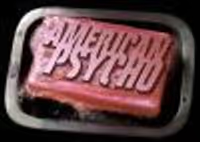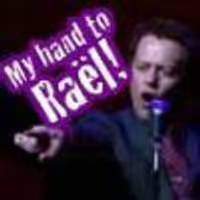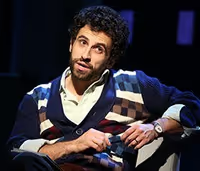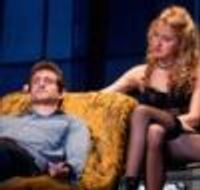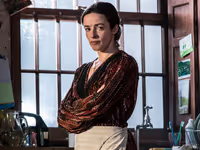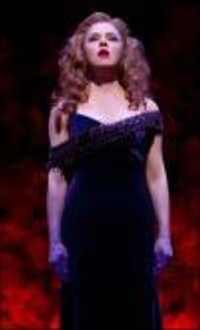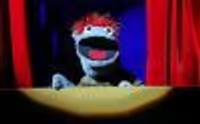Deaf West's Spring Awakening Broadway Previews
#225Deaf West's Spring Awakening Broadway Previews
Posted: 9/24/15 at 9:23am
Jace2017 said: "Thanks Little Sally! Could anyone also explain what exactly happens at the end that is so moving? I haven't gotten to see the show yet. Hopefully I get to go in December."
Isn't surprise better than anticipation?
#226Deaf West's Spring Awakening Broadway Previews
Posted: 9/24/15 at 12:43pm
I want to know why the purple summer isn't wheelchair-accessible.
broadwayguy2
Broadway Legend Joined: 5/18/03
#227Deaf West's Spring Awakening Broadway Previews
Posted: 9/24/15 at 2:21pm
I think explaining what happens cheapens the experience. When I saw it, I did not expect it at all and I found it incredibly moving.
As far as the beat between "Those You've Known" and "Purple Summer", the epilogue, I don't feel that it is heavy handed. I find that it is an organic response to the moment and end of the show.lol the audience is cheering. I saw the invited dress and most everyone in the audience knew that Purple Summer was yet to come, yet the enthusiastic response was still certainly there and genuine.
broadwayguy2
Broadway Legend Joined: 5/18/03
#228Deaf West's Spring Awakening Broadway Previews
Posted: 9/24/15 at 2:23pm
I assume that the "wheelchair accessible" comment is in jest, but for me, felt that there was a (perhaps unintended) message that those limitations and trappings were able to be left behind, no pun intended..
#229Deaf West's Spring Awakening Broadway Previews
Posted: 9/24/15 at 2:43pm
It kind of was in jest, but it also bothered me. Anna's been able to propel herself and get around just fine up until that point -- now she's being carried? Why?
broadwayguy2
Broadway Legend Joined: 5/18/03
#230Deaf West's Spring Awakening Broadway Previews
Posted: 9/24/15 at 3:08pm
Not disagreeing.
though I felt that a ramp may have hunted at what's to come... And I'd like to take it as I interpreted.
#231Deaf West's Spring Awakening Broadway Previews
Posted: 9/24/15 at 3:19pm
broadwayguy2 said: "I think explaining what happens cheapens the experience. When I saw it, I did not expect it at all and I found it incredibly moving.
As far as the beat between "Those You've Known" and "Purple Summer", the epilogue, I don't feel that it is heavy handed. I find that it is an organic response to the moment and end of the show.lol the audience is cheering. I saw the invited dress and most everyone in the audience knew that Purple Summer was yet to come, yet the enthusiastic response was still certainly there and genuine.
I don't know, when I saw it, the transition was kind of awkward and it seemed like the audience thought the show was over. The "beat" is too long, and I think it's awkwardly staged. But that doesn't take away from the staging of "The Song of Purple Summer."
broadwayguy2
Broadway Legend Joined: 5/18/03
#232Deaf West's Spring Awakening Broadway Previews
Posted: 9/24/15 at 6:32pm
Well, it IS an unattached epilogue.
I understand your opinion, and I agree. With it... But to the extent that it is inherent in the writing of the show. In the original production, I felt EXACTLY that way. But I think my familiarity with that allowed me to view that staging independently and separate the writing versus the staging. I found the staging to be far more successful than it has a right to be and the final tableau attaches it to the rest of the show in a way that the original simply didn't. The song is basically a detached commentary and this staging at least gives it a connection.
When I saw the original production, the reaction was to "Those You've a Known" being the end of the show, which it rightfully is,
#233Deaf West's Spring Awakening Broadway Previews
Posted: 9/25/15 at 3:35am
Spring Awakening led the LA Stage Alliance Ovation Awards nominations today with 16 noms for both its 99-seat and 500-seat runs in LA:
Best Production of a Musical, Intimate Theater
Best Production of a Musical, Large Theater
Best Acting Ensemble for a Musical
Best Choreography (Spencer Liff)
Best Musical Direction (Jared Stein)
Best Direction of a Musical (Michael Arden)
Lead Actress in a Musical (Sandra Mae Frank)
Lead Actor in a Musical (Austin McKenzie)
Featured Actress in a Musical (Krysta Rodriguez)
Featured Actor in a Musical (Andy Mientus)
Best Lighting Design, Large Theater (Ben Stanton)
Best Lighting Design, Intimate Theater (Travis Hagenbuch)
Best Scenic Design, Large Theater (Dane Laffrey)
Best Sound Design, Intimate Theater (Philip Allen)
Best Video/Projection Design (Lucy Mackinnon)
Best Season (Wallis Annenberg Center)
The acting nominations for Sandra, Austin, Andy and Krysta are a pleasant surprise!
Updated On: 9/25/15 at 03:35 AM
#234Deaf West's Spring Awakening Broadway Previews
Posted: 9/25/15 at 10:26am
Saw this on Sunday and really, really loved it. Anyone who knows me knows what the original meant to me, so keep that in mind when I say I liked this better. There are things that I've never liked that I still feel just don't work - namely The Mirror Blue Night, but I can overlook that because the rest is so perfect. Yes, the audience thought it was over after Those You've Known - a few people were already standing - but I didn't find it too distracting.
This production makes explicit things that were latent in the original. This Ilse is very clearly a lost, wandering drug addict. I felt a lot less sad for her in the original, where she came onstage wearing a nightshirt and carrying flowers. Here she is much more desperate. I also realized that the reason she wants Moritz to come home with her is that this is the first time she'd BEEN home in weeks. For some reason I just never grasped that in the original.
The sign language never bothered me, thought I was afraid it might. I don't want to spoil anything, but the moments when the deaf characters speak or scream were some of my favorites in the entire production.
Sam2
Stand-by Joined: 9/23/15
#235Deaf West's Spring Awakening Broadway Previews
Posted: 9/25/15 at 1:20pm
I got the chance to see this with a lottery discount ticket. Thought it was a very beautiful and moving show, with a talented and extremely energetic cast. Would definitely recommend this. (Despite some serious problems with the book) Does anyone have an idea of what Melchior signed before leaving the stage after The Song of Purple Summer, by the way? Didn't really get it, and I might have missed a projection.
#236Deaf West's Spring Awakening Broadway Previews
Posted: 9/25/15 at 1:46pm
There will be $35 lottery ticket for the opening on Sunday!
http://www.talkinbroadway.com/allthatchat/d.php?id=2305770
DeafScribbler
Swing Joined: 11/2/14
#237Deaf West's Spring Awakening Broadway Previews
Posted: 9/25/15 at 5:39pm
Read all 10 pages of this thread and I would like to take the time and answer some questions previous posters have brought up:
Before I continue, would like to let that poster who asked for a Deaf perspective to type up - and here I am! I am Deaf and fully bilingual-bicultural in ASL/English.
For a potential video recording, I would strongly recommend that closed captioning and/or subtitles be used. Sometimes there are "sign accents' that get in the way (variations of regional signs, for instance, or sloppy signing), and having the text would be beneficial. A second point would to be able to compare the ASL translation with the original English lines/lyrics. So yes, CC or SDH for this.
Theories comparing the communication barriers with the prohibition of sign language is very valid - the story takes place in the late 1800s. Brief history lesson here: ASL was taught in schools from 1817-1880, until the conference in Milan, Italy attended predominantly by oral educators with a handful of Deaf teachers in attendance. They surmised that oralism was the superior way to educate Deaf students. Communication came first, education second. This "Dark Ages" lasted until 1965 when William Stokoe studied ASL and declared it to be a true language in its own, and not a broken-down version of English. Even so, oralism was used in the early grades and the "oral failures" were allowed to be educated in sign language in the high school years - oftentimes by educators who were not fluent in sign.
Fun fact: "The Jazz Singer' was in fact NOT the first talking film - the Deaf community had been using the emergence of film as a way to preserve sign language - the 1913 video by the president of the National Association of the Deaf, George Veditz, now has been preserved for eternity in the Film archives along with other culturally significant films. That's not the earliest found - there's a 1903 film by Thomas Edison (yes, that Edison) taping a young Deaf pupil reciting the "Star-Spangled Banner".
Back to the questions and clarifications:
"ASL translator" - they are known as ASL interpreters, Deaf usually shorten it to 'terp in informal situations.
"non-hearing" or "hearing-impaired". I would strongly advise that Deaf (and Hard of Hearing) be used instead. Many Deaf see the term "hearing impaired" as insulting. Yes,there are many deaf people out there that are not culturally Deaf - but in the case of this particular production, most if not all Deaf actors would identify themselves as Deaf (or Hard of Hearing).
I myself have not seen the show - I did see "Pippin" at the Mark Taper Form. While the show itself was wonderful, I found it hard to follow as my seat was too far back to read the signs well, and I was frustrated, wanting to know the English translation too (I did fine with "Corner of the Sky" which I had the English lyrics memorized - thus that was my favorite scene). So I didn't enjoy it as much as I wanted to. I'm glad to see that text projections/supertitles are being used. Are they only for the sign language portions, or for the entire show?
I have seen within the Deaf community - many love it (mostly the fact that it's got so many young Deaf actors making their debuts on Broadway), while there are others that feel that the show was designed for hearing audiences, not Deaf. (This was the sentiment with "Pippin", and hence why I was reluctant in seeing "Spring Awakening" - I too was not overly fond of the original which I saw on tour.) So I would say it's half-half with the Deaf/ASL community. Hearing ASL users (ASL students, 'terps - see what I did there? : ) - educators, etc tend to LOVE the production - even those who have not seen it, love the idea. On the other hand, Deaf either love it, or are wary of it.
(There was a show put on at Gallaudet about Helen Keller, and it too outlined the theme of communication. One Hard of Hearing audience member put it succinctly: "if you can hear, you will enjoy the show. If you can't hear, you most likely will not enjoy the show." I found myself agreeing with him - both of us had enough residual hearing (him) and cochlear implants (me) to be able to follow along and enjoy it (thank god for the supertitles!) while other Deaf, non-amplified audiences found it challenging to follow, let alone enjoy).
Do let me know if I can be of any assistance to clarify things up or answer a question or two : )
I wish the show the best of luck in its run.
#238Deaf West's Spring Awakening Broadway Previews
Posted: 9/25/15 at 8:07pm
I don't see why the Acting nods for the LA Ovations are a surprise. I think there could have been more Acting nominations and I would love to see these fine young Actors be recognized in the Spring when NY nominations are announced. This show is a Winner all around!
Thank you DeafScribbler for your insight and knowledge, you really should see this show, your take on it would be most welcomed.
#239Deaf West's Spring Awakening Broadway Previews
Posted: 9/25/15 at 8:16pm
DeafScribbler said: "I'm glad to see that text projections/supertitles are being used. Are they only for the sign language portions, or for the entire show? "
They're only being used for scenes where someone is signing and no one is voicing them, or someone is speaking and no one is signing.
I can see a video working if the subtitles were used in the same typeface and style as they are on stage, which would preserve the look and feel they're going for.
Thank you for your very insightful post!
#240Deaf West's Spring Awakening Broadway Previews
Posted: 9/25/15 at 10:13pm
Sam2 said: "I got the chance to see this with a lottery discount ticket. Thought it was a very beautiful and moving show, with a talented and extremely energetic cast. Would definitely recommend this. (Despite some serious problems with the book) Does anyone have an idea of what Melchior signed before leaving the stage after The Song of Purple Summer, by the way? Didn't really get it, and I might have missed a projection. "
Potential spoiler?
He signs the final lyric: All shall know the wonder of purple summer.
End of potential spoiler!
I saw this last night. I was involved in one of the national tours of the original production, so there's a special place in my heart for the show. I'm also very fascinated in Deaf culture and ASL, so this production seemed tailored for me as an audience member. I absolutely loved it. The concept added so many new layers that resonate both in the setting of the play and in today's society. Austin P. McKenzie is a revelation as Melchior. The ASL translations are beautiful and illuminate many of the ornate or ambiguous lyrics. (For example, it's evident exactly which "things" Wendla has no way of handling in "Mama Who Bore Me," and Moritz's dreams both in monologue and song are quite explicit. In this sense, "The Bitch of Living" is not only a rockin' song but a comedy number.)
There's so many other ways I found this production brilliant, like the subtleties of the signs (older vs. newer signs, Wendla signing that she "feels" Melchior's heart beat instead of "hear" that is spoken in the text), the way the inner voices are the band, the wonderfully smart design (including an incredible sound design, ironically), the times when the hearing characters say things behind a deaf character's back, the times when the deaf characters use voice, the little changes to the orchestration and vocal "design." How different Act 2 is with a fully realized Moritz/Ilse scene. This production makes Spring Awakening feel not like a revival but a brand new show.
broadwayguy2
Broadway Legend Joined: 5/18/03
#241Deaf West's Spring Awakening Broadway Previews
Posted: 9/26/15 at 3:23am
The Moritz / Ilse scene and aftermath SHATTERED me.
Updated On: 9/27/15 at 03:23 AM#242Deaf West's Spring Awakening Broadway Previews
Posted: 9/26/15 at 10:52am
broadwayguy2 said: "The. Morris. / Ilse scene and aftermath SHATTERED me.
Same here. It's always been my favorite scene in the show but it never made me as emotional as it did in the revival.
"
c0113g3b0y
Leading Actor Joined: 9/16/15
#243Deaf West's Spring Awakening Broadway Previews
Posted: 9/26/15 at 9:47pm
https://www.broadwayworld.com/videoplay.php?colid=1120512
some highlights. wow. the first part of the clip where Wendla's voice is interacting with deaf Wendla through the mirror gave me chills.
#244Deaf West's Spring Awakening Broadway Previews
Posted: 9/26/15 at 11:07pm
Can someone explain to me what Krysta does that is so shocking (based off what I read on this board) and the ending (with a forrest)? I'm not seeing the show and would love to know what everyone is talking about.
Wildcard
Broadway Legend Joined: 6/21/06
#245Deaf West's Spring Awakening Broadway Previews
Posted: 9/28/15 at 2:19pm
SPOILER:
So looking at the pictures of the "forest" for the Broadway staging, the doorway seems smaller than the one in LA. It certainly seems to diminish the effect albeit there are now more trees than there were in LA.
playbill-love
Featured Actor Joined: 7/30/13
#246Deaf West's Spring Awakening Broadway Previews
Posted: 9/28/15 at 2:40pm
Explanation of the Moritz/Ilse scene
SPOILERS
Ilse hears the gunshot and comes back onstage to discover Moritz's body after the end of the DDS/BW scene.
END SPOILERS
mailhandler777
Broadway Legend Joined: 8/15/15
#247Deaf West's Spring Awakening Broadway Previews
Posted: 9/29/15 at 4:03am
I see that Van Hughes has been on for like the last 2/3 weeks as the voice of Ernst. What happened to the other guy that did that.
mpd4165
Leading Actor Joined: 8/6/09
#248Deaf West's Spring Awakening Broadway Previews
Posted: 9/29/15 at 10:21am
mailhandler777 said: "I see that Van Hughes has been on for like the last 2/3 weeks as the voice of Moritz. What happened to the other guy that did that.
"
https://twitter.com/daniestew/status/646367812924112896
seems he had a vocal hemorrhage.
#249Deaf West's Spring Awakening Broadway Previews
Posted: 10/3/15 at 8:24pm
I saw the production last night, and I guess I'm an outlier, but it did virtually nothing for me. Full disclosure, I don't think it's a very good show- the music is gorgeous, but I think the book is weak and watered down, and the lyrics are laughably amateurish. I think concept-wise, I appreciated what Arden was going for, and there were a few moments where it paid off beautifully, especially Moritz's last moments and Wendla's last scene with her mother. But i was sitting in the rear mezz, and I felt like I was watching the show underwater. There was so much going on, between the signing, singing, and movement, that everything felt jumbled.
I felt as though this production worked beautifully in a small theatre, but in a Broadway house the show didn't register. With a character like Moritz or Wendla, it was so hard to see their faces that I didn't feel I connected to the characters at all because their voices were separated from the bodies. I really wanted to love this- I think it's great that a show like this is on Broadway, and I appreciate the work and care put into it, but I was left totally cold.
Videos


